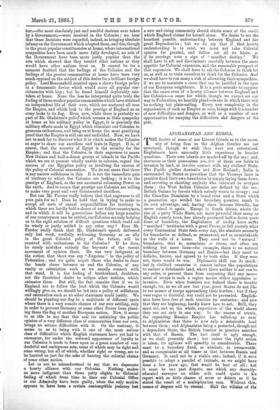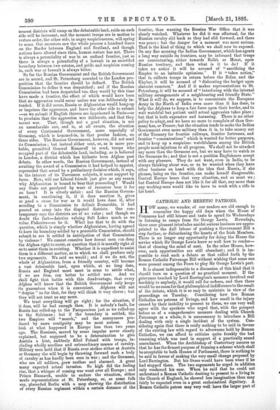AFGHANISTAN AND RUSSIA.
THE doubts of some of our Liberal friends as to the necessity of being firm on the Afghan frontier are not unnatural, though we wish they were not entertained. Englishmen have unusually little experience in frontier questions. Their own islands are marked-off by the sea ; and, enormous as their possessions are, few of them are liable to invasion by land, or involve contact with any civilised State. The Pacific girdles Australia and New Zealand ; India is surrounded by States so powerless that the Viceroys have in practice fixed their own boundaries by simply laying them down, and arresting or shooting anybody who ventuied to overpass them ; the West Indian Colonies are defined by the sea ; British Guiana by forests which nobody wants to occupy ; and the Canadian Dominion by a broad river and a State which a generation ago settled the boundary question much to its own advantage, and, having since become friendly, has never raised it again. Except in South Africa, where the rise of a petty White State, not more powerful than many an English county town, has already produced half-a-dozen questions of boundary, the Englishmen of to-day have nefer " marched " territories with a great Power, or felt acutely what every Continental State feels every day, the absolute necessity for boundaries as defined, as permanent, and as unmistakable as the walls of a house. They need not be " natural " boundaries, that is, mountains or rivers, and often are nothing but mere lines—for example, there is no natural boundary between Germany and Russia—but they must be definite, known, and agreed to by both sides. If they were not, there would be war. Diplomatic skill can do much ; but in civilised countries it cannot induce the populations to endure a debateable land, where there neither is nor can be any order, or prevent them from suspecting that any movement of troops in such a region means either aggression or invasion. Even when frontiers are defined there is trouble enough, for, as we all saw last year, great States do not like to see masses of troops approaching their borders ; but if they were vague or doubtful, war could not be prevented. Englishmen have been free of such troubles for centuries ; and now that they are beginning, hardly know how to act. Still, they must act, and on the whole, experience of the world shows they can act only in one way. In the course of events, the expanding Russian Empire has rolled-up so near to Afghanistan that there is now only a debateable land between them ; and Afghanistan being a protected, though not a dependent State, the British frontier in practice marches with that of Russia. The fact itself is ugly enough, as we shall presently show ; but unless the right action is taken, its ugliness will speedily be unendurable. There must be a boundary fixed, as absolute, as irremovable, and as recognisable at all times as that between Russia and Germany. It need not be a visible one ; indeed, if it were possible to adopt a parallel of latitude, as we might have done a few years ago, that would be best of all ; but it must be one past dispute, one which any decentlyeducated surveyor on either side could quote in h:s report with as little chance of error or debate as if he stated the result of a multiplication sum. Without this, causes of dispute will be eternal. Half the villains of thr
nearest districts will camp on the debateable land, raids on each side will be incessant, and the moment troops are in motion to restore order, the other side, in angry suspiciousness, will spring to arms. Our ancestors saw the whole process a hundred times on the Border between England and Scotland, and though nations have altered since then, human nature has not. There is always a potentiality of war in an unfixed frontier, just as there is always a potentiality of a lawsuit in an unsettled boundary between two estates, and pride and suspicion coming in, such war or lawsuit is always bitter.
So far the Russian Government and the British Government are in accord, and St. Petersburg assented to the London pro position that the frontier should be defined. The British Commission to define it was despatched ; and if the Russian Commission had been despatched too, they would by this time have made a frontier, the effect of which would have been that no aggression could occur unless war was deliberately intended. If it did occur, Russia or Afghanistan would hang-up or imprison the aggressors, and leave the other side to submit —as we submit if English thieves are imprisoned in Paris—or to proclaim that the aggression was deliberate, and that they meant war. That, though not a good situation, is not an unendurable one, and is, at all events, the situation of every Continental Government, more especially of Germany, which is hemmed-in, in that precise fashion, on three sides. The Russian Government, however, did not send its Commission ; but instead either sent, or, as is more pro bable, permitted General Komaroff to send, troops who occupied part of the debateable land, including, as is believed in London, a district which has hitherto been Afghan past debate. In other words, the Russian Government, instead of awaiting the award of a Commission it had helped to appoint, superseded that award by a preliminary decision which, it says, in the interest of its Turcoman subjects, it must support by force. Now, will our Liberal friends just give us any reason why Afghanistan is bound to bear that proceeding Would any State not paralysed by want of resources bear it for an hour? It is utterly unfair ; and the Russian Govern ment, in sanctioning it, if it does sanction it, gives as good a cause for war as it would have done if, after acceding to a Commission to delimit Bessarabia, it had
poured an army into the disputed districts. One contemporary says the districts are of no value ; and though we
doubt the fact—Asiatics valuing Salt Lakes much as we value Fisheries—so be it. What has that to do with the question, which is simply whether Afghanistan, having agreed to have its boundary settled by a peaceable Commission, should submit to see it settled in anticipation of that Commission by violence We cannot conceive how decent men can deny the Afghan right to resist, or question that it is morally right of us to assist them in resisting. Whether it is expedient to assist them is a different matter, as to which we shall produce only two arguments. We said we would ; and if we do not, the whole of Afghanistan, from a friendly country, will become a vast debateable land, upon which, at no long date, Russia and England must meet in arms to settle what, if we are firm, can better be settled now. And we shall fight that battle with this disadvantage, that every Afghan will know that the British Government only keeps its guarantees when it is convenient. Afghans will not "despise " us for that, for they will think it very clever ; but they will not trust us any more. We trust everything will go right ; for the situation, if it does, will be bad enough then. It is nobody's fault, for Russia has rolled-up to the Paropamisus just as we rolled-up to the Suleiman ; but if the boundary is settled, the two Empires will "march," and the annoyances pro duced by mere contiguity may be most serious. Just look at what happened in Europe less than two years ago. The Russians, moved by some impulse never clearly explained, but supposed to be a determination to give Austria a hint, suddenly filled Poland with troops, including wholly needless and extraordinary masses of cavalry. Military men hold that if Russia ever strikes either at Austria or Germany she will begin by throwing forward such a body of cavalry as has hardly been seen in war ; and the Germans, who are all soldiers, grew restless and alarmed. A great many expected actual invasion. So high did the feeling rise, that a whisper of coming war went over all Europe ; and Prince Bismarck, unable to endure the situation, either made representations at St. Petersburg, or, as some folk say, placarded Berlin with a map showing the distribution of every Russian regiment within a certain distance of the frontier, thus warning the Russian War Office that it was closely watched. Whatever he did it was effectual, for the Russian cavalry slid back as they had slid forward, and there was peace ; but the danger for a moment was most serious. That is the kind of thing to which we shall now be exposed. On any fine morning the Indian Government, which has agents a long way outside its frontiers, may be informed that troops are concentrating, either towards Balkh or Herat, upon Russian territory, and then what is it to do ? If it takes no notice it will be accused of "sacrificing the Empire to an imbecile optimism." If it "takes notice," that is, collects troops in return before the Bolan and the Khyber, it will be accused of "dislocating the budget upon alarmist rumours." And if it makes representations to St. Petersburg, it will be accused of "interfering with the internal military arrangements of a neighbouring and friendly State." What it will do, we suppose, is to concentrate the European Army in the North of India even more than it has done, to help the Afghans to keep a fair force upon their border, and to wait watchful but patient until actual aggression takes place ; but that is both expensive and harassing. There is no other policy to adopt, and we have no more to complain of than Germany has, or France; but the situation tends to make the Indian Government even more military than it is, to take money out of the Treasury for frontier railways, frontier fortresses, and frontier "concentrations" which is wanted for better purposes, and to keep up a suspicions watchfulness among the British people most injurious to all progress. We shall not be attacked any more than the Germans are, but we may have to watch as the Germans do ; and that is not a position Englishmen accept with any pleasure. They do not want, even in India, to be always thinking about war, or to be worried when they have other business on hand with the idea that Russia, if she pleases, being on the frontier, can make herself disagreeable. Central Europe bears that very situation, and so must we ; but Central Europe does not like it for all that, any more than any working-man would like to have to work with a rifle in his hand.



































 Previous page
Previous page